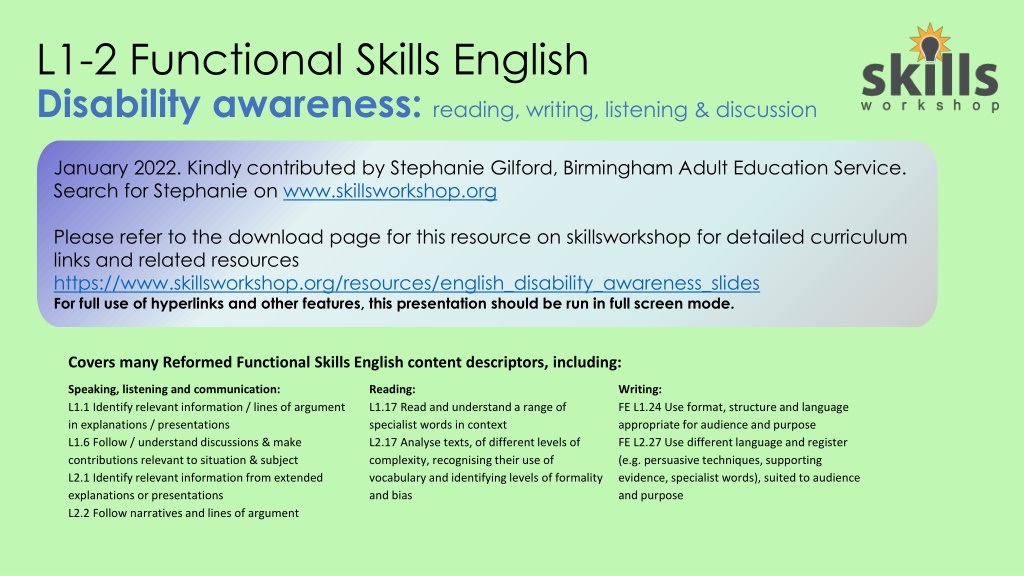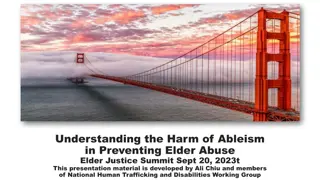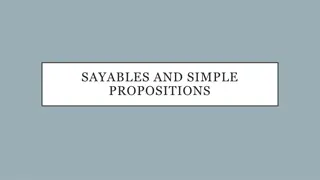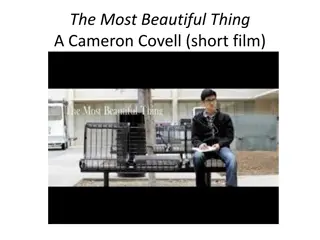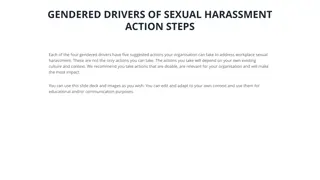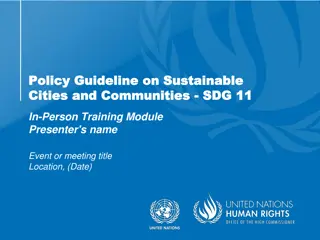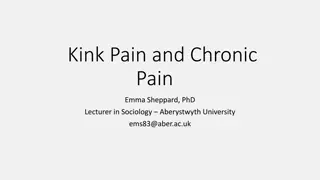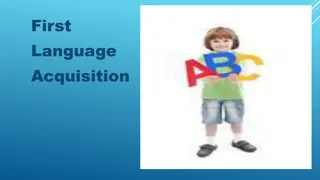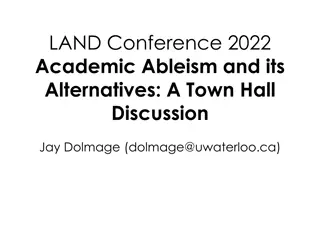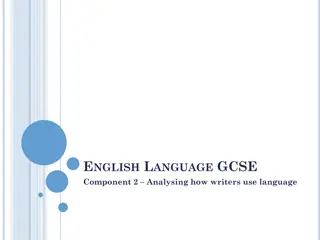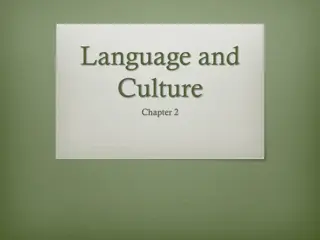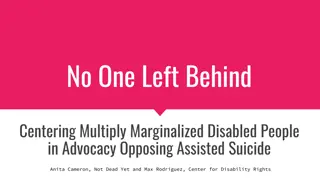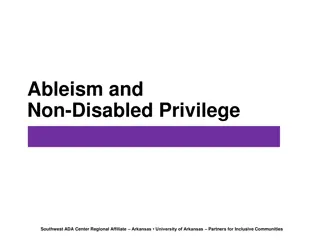Understanding Ableism and Challenging Ableist Language
Ableism is a form of discrimination favoring able-bodied individuals over disabled people. This resource explores the concept of ableism, the impact of language on the disabled community, and strategies to combat ableist language. It covers key vocabulary, shocking statistics on disability discrimination, and the importance of language in promoting inclusivity and understanding. By raising awareness and challenging ableist language, we can work towards a more inclusive society for all.
Download Presentation

Please find below an Image/Link to download the presentation.
The content on the website is provided AS IS for your information and personal use only. It may not be sold, licensed, or shared on other websites without obtaining consent from the author. Download presentation by click this link. If you encounter any issues during the download, it is possible that the publisher has removed the file from their server.
E N D
Presentation Transcript
Description: swlogo L1-2 Functional Skills English Disability awareness: reading, writing, listening & discussion January 2022. Kindly contributed by Stephanie Gilford, Birmingham Adult Education Service. Search for Stephanie on www.skillsworkshop.org Please refer to the download page for this resource on skillsworkshop for detailed curriculum links and related resources https://www.skillsworkshop.org/resources/english_disability_awareness_slides For full use of hyperlinks and other features, this presentation should be run in full screen mode. Covers many Reformed Functional Skills English content descriptors, including: Speaking, listening and communication: L1.1 Identify relevant information / lines of argument in explanations / presentations L1.6 Follow / understand discussions & make contributions relevant to situation & subject L2.1 Identify relevant information from extended explanations or presentations L2.2 Follow narratives and lines of argument Reading: L1.17 Read and understand a range of specialist words in context L2.17 Analyse texts, of different levels of complexity, recognising their use of vocabulary and identifying levels of formality and bias Writing: FE L1.24 Use format, structure and language appropriate for audience and purpose FE L2.27 Use different language and register (e.g. persuasive techniques, supporting evidence, specialist words), suited to audience and purpose
Ableism: What is it and how can we stop it? What is ableism? You ve heard of racism and sexism, but if you haven t heard of another -ism ableism then chances are this form of discrimination doesn t affect your daily life. By definition, ableism is described as discrimination in favour of able-bodied people, which means people who are disabled are more likely to experience ableism. Who is protected by the equality act? physical disabilities learning disabilities such as dyslexia developmental disabilities such as autism speech and language impairments. How are disabled people are disadvantaged in the UK? Key Vocabulary Check your answers here: https://www.scope.org.uk/media/disability-facts-figures/ discrimination dyslexia Why do you think people might be uncomfortable talking to a disabled person? impairments Shocking statistics According to (disability equality charity) Scope, two-thirds of the British population feel uncomfortable talking to a disabled person, says Hale. Why? If you can work out why you're uncomfortable, you're well en route to changing it. Shocking statistics There are 14.1 million disabled people in the UK. 8% of children are disabled. 19% of working age adults are disabled 46% of pension age adults are disabled Text source: https://parade.com/1232975/stephanieosmanski/what-is-ableism/ https://www.scope.org.uk/media/disability-facts-figures/
The importance of language Some of our most common, ingrained expressions have damaging effects on millions of people and many of us don't know we're hurting others when we speak. How might these expressions make others feel? Key Vocabulary Ingrained Omnipresent Ableist language Undermine This kind of ableist language is omnipresentin conversation: making a dumb choice, turning a blind eye to a problem, acting crazy , calling a boss psychopathic , having a bipolar day. And, for the most part, people who utter these phrases aren t intending to hurt anyone more commonly, they don t have any idea they re engaging in anything hurtful at all. Why might we use terms like this without thinking? The impact of words How can we combat this habit? What can we do to change it? However, for disabled people like me, these common words can be micro-assaults. For instance, falling on deaf ears provides evidence that most people associate deafness with wilful ignorance (even if they consciously may not). But much more than individual slights, expressions like these can do real, lasting harm to the people whom these words and phrases undermine and even the people who use them in daily conversation, too . What comes to mind when you hear the word disability ? Text source: https://www.bbc.com/worklife/article/20210330-the-harmful-ableist-language-you-unknowingly-use
The importance of language Hale adds that using disability as a shorthand for something negative or inferior reinforces negative attitudes and actions and fuels the larger systems of oppressionin place. We build a world with the language we use, and for as long as we're comfortable using this language, we continue to build and reinforce disableist structures, they say. Discussion point What is an invisible illness/disability? First, these words give an inaccurate picture of what being disabled actually means. To describe someone as crippled by something is to say that they are 'limited' [or] 'trapped', perhaps, says Hale. But those aren't how I experience my being. Can you give some examples? Discussion point Which punctuation marks are used on this slide? How confident are you with each of them? Why do we tend to see disabled Key Vocabulary A picture containing person, indoor, curtain, scene people as inspirational? Watch this video and listen to Stella Young s speech. Why does she not want to be considered inspirational? How should we treat disabled people? shorthand Description automatically generated inferior oppression What does this mean? One of the most effective ways to move away from ableist language is understanding the disabled community, having conversations and listening to their concerns. Text source: Video source: https://www.youtube.com/watch?v=8K9Gg164Bsw
What year do you think this article is from? Apple announces 'disability-themed emojis In a move to bring more diversity to the keyboard, Apple released new disability-themed emojis Tuesday that will be available in the fall. Users of iPhones will soon be able to send a guide dog, an ear with a hearing aid, a person in a wheelchair, a prosthetic arm and a prosthetic leg, among other new options. Do you have any questions about this article, and the year these emojis were introduced? Use the question words listed below to write a question of your own. These new emojis will enable one billion people with disabilities around the world to more fully and authentically express themselves . Apple announces 'disability-themed emojis Representation matters and for those living with MS, some of whom have visible disabilities, this is an important way for them to feel included and seen, said Cyndi Zagieboylo, president and CEO of the National Multiple Sclerosis Society. What does it mean to feel seen ? Why is it important for us to feel seen and included? Are there any emojis that you think are missing? Look at your phone. Are you represented by the choice of emojis? Text source: https://www.nbcnews.com/tech/tech-news/apple-announces-disability-themed-emojis-arrive-fall-n1030896
What should we include in a letter to make it persuasive? Discuss this in your groups and make a list. Discussion point What does the word accessible mean in reference to equal rights for disabled people? Why is it important that buildings, and websites, and facilities are fully accessible? What does a good piece of writing need? Writing task Stretch and challenge: What about the website of your service? What changes could be made to make a website FULLY accessible? 1. Walk around the building that your class is held in. Is it a completely accessible building? You will need to spend some time thinking about this. Use the link below to help you determine what a fully accessible building could look like. https://accessibility.blog.gov.uk/20 16/05/16/what-we-mean-when- we-talk-about-accessibility-2/ https://www.archiscene.net/education/make-your-school-accessible-for-all-abilities/ 2. Write a letter to the head of service explaining three main changes that could be made to the building, why it is important, and how it would benefit disabled people in accessing the building. Use the above link to help you figure out what a fully accessible website might look like. How does your website compare? Try to make sure your letter is as persuasive as possible!
